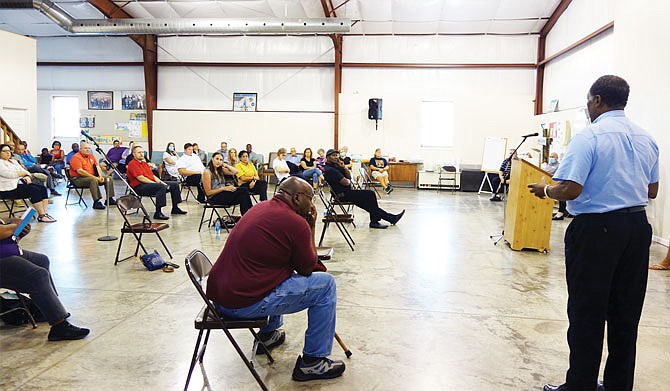During a wide-ranging community forum Monday evening, Fulton residents and officials agreed on one thing: The city could use more Black people teaching, policing and working other key jobs within the community.
Hosted by Guiding Light Baptist Church, the forum loosely centered around race in the community. Representatives from the Callaway County Sheriff's Office, Fulton Police Department, city of Fulton, Fulton Public Schools, the courts, local churches, the NAACP and the Human Rights Commission were in attendance, along with members of the public. In total, around four dozen people sat in wide-spaced chairs in the church's sanctuary.
"We may think we're isolated from a lot of issues going on in the country, but I thought a conversation would be appropriate," said Matt Gowin, a member of FPS's Board of Education and one of the event's organizers. "Hopefully we will all learn something together tonight."
The meeting followed weeks of international protests in the wake of the death of George Floyd, a Black Minneapolis man who died in late May while being detained by police. Fulton hosted two marches of its own, on June 6 and June 19.
A large portion of the evening's focus landed on the small number of Black and other minority officers in the FPD and CCSO.
Dr. Thomas Cooper, a now-retired Fulton physician and Black man - "I've had my hand on the pulse of the people," he quipped - said being a doctor wasn't his first choice of career.
"My first dream was to become a policeman or a fireman," he said. "I couldn't - because I was black. If we look here and don't see issues, we need to get glasses."
Bob Washington, the recently elected Ward 4 Fulton City Council member, said that when he first moved to Fulton, it was difficult to land certain city jobs as a Black man. Open positions tended to get filled by the friends and family members of current employees, he said.
He encouraged heads of departments to fairly evaluate applicants.
"Give people a fair chance when they apply for jobs," Washington said. "Also, encourage African Americans to apply."
That's the challenge, according to Sheriff Clay Chism and Police Chief Steve Myers.
"My application pool is usually 100 percent white males," Chism said.
And the pool is small: Chism advertised two open road deputy positions early this year and received only eight applications; only one candidate passed required testing to receive a job offer.
Some large departments can pay for new recruits' police academy tuition and equipment and also pay salary and benefits while the recruits are enrolled. After graduation, the recruits are contractually bound to stay with the department for several years. It's a useful recruitment tool, the two explained. But neither department has the budget to do so - Chism calculated that covering salary, benefits, tuition and equipment for the 16 weeks of police academy would cost about $25,000 per recruit.
That's something the community could cover, audience members suggested.
"If you're willing to step up and pay a little more in taxes (we could) establish a fund," the Rev. Charles Jackson, pastor at Guiding Light Baptist Church, told the crowd. "This is your community - they're going to be policing you - so you should have some investment."
Bill Nigus, pastor at Central Christian Church, said he's confident he could raise enough money to fund one recruit a year.
"When are we having lunch?" Chism joked.
Cooper brought up the potential for recruiting from Lincoln University's criminal justice department in addition to among locals.
Beth Houf, principal at Fulton Middle School, shared she's faced similar challenges in recruiting Black teachers.
"We still have so much work to do," she acknowledged.
Speakers also touched on the importance of encouraging youth to pursue trade jobs in the community and the need for expanded access to mental health services.
Jackson said he'd like to host a second conversation focused on area schools in the future.

